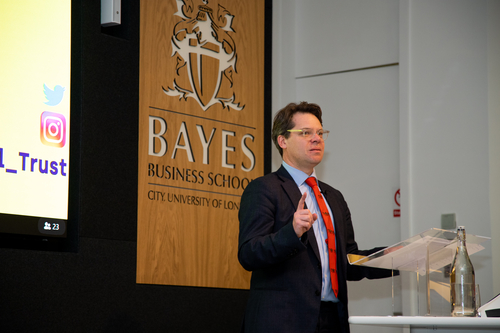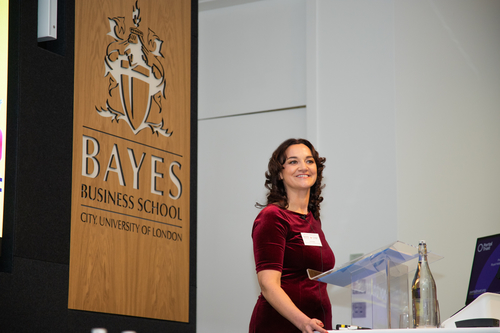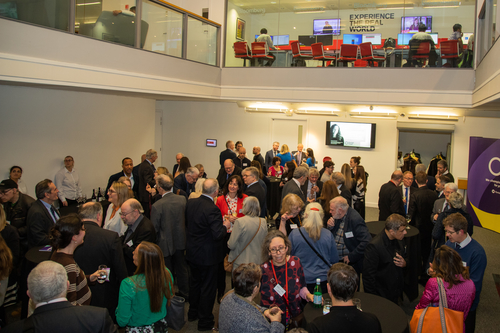Effectively promoting creative opportunities and positive values can unlock the potential in our prisons
Professor Rosie Meek’s Portal Trust Education Lecture discussed how physical activity and transformational learning can help make prisons healthier and safer.
Professor Rosie Meek says properly embedding physical education in prisons is crucial to unlocking wasted potential and opportunities for transformational learning.
Professor Meek spoke on the subject of ‘The importance of sport and physical activity in supporting education and rehabilitation in our prisons’, in the second Portal Trust Education Lecture, which was hosted by Bayes Business School (formerly Cass).
A Charted Psychologist and founding Head of the Law School at Royal Holloway, University of London, Professor Meek discussed how her research over the past 15 years promotes education and employability in youth prisons.
Professor André Spicer, Dean at Bayes Business School, opened the conference by discussing redemption. “We all have the fact in common that we have made mistakes. But just as we have done wrong, our forms of redemptions are various. One of these can be through physical exercise.”
 Professor André Spicer opens the Portal Trust Education Lecture
Professor André Spicer opens the Portal Trust Education Lecture
Sophie Fernandes, Chairman of the Portal Trust, introduced Professor Meek, whose experiences at the New Bridge Foundation, Howard League for Penal Reform and Brighton & Hove Youth Offending Service put her on her career path.
“As a forensic psychologist, I am aware of the untapped potential in our prisons,” said Professor Meek, who highlighted the fact that the UK has the highest incarceration rate in western Europe. “There is value to be had in seeing potential where it may not immediately be clear. For those detained we need to be more creative and effective if we are to rehabilitate effectively. Physical education isn’t a ‘cure all’ solution, but creative interventions can play a valuable role.
“When I was volunteering early in my career, I had a sense of despair at the lack of work in this area and felt that we should and could do more. I am still struck by that wasted potential in our prisons, here and overseas.”
Professor Meek highlighted that 89 per cent of young people in prison have been excluded from school, and although less than one per cent in the general population have experienced social care, more than half of those children in custody have.
She listed high levels of staff absence, early departure (within three years) from the point of joining the sector, and operational challenges as factors which contribute to making it hard for prisons to operate effectively and safely. She praised the work of Physical Education Officers, who “give hope behind prison walls”, and said the focus must be on transferring positive lessons into prisons and developing interpersonal relationships.
 Professor Rosie Meek speaks to the audience
Professor Rosie Meek speaks to the audience
“I am in awe of prison educators who strive to embed education in sport and sport in education,” she said. “We need good leaders who promote positive values. I have worked with people who benefit from a passion for sport, being given educational opportunities, and studying towards vocational qualifications. These opportunities need to be made more widely available, and need to be promoted to everyone, not just sporty types.”
In 2018, Professor Meek conducted a national review of the provision of physical activity in youth and adult prisons, on behalf of the Ministry of Justice, which led to several policy changes. Of the 12 recommendations in A Sporting Chance: An independent Review of Sport in Youth and Adult Prisons, all but one were accepted by the government.
“We have come some way from years past. From punishment through movement in prisons 200 years ago to now using it to communicate and teambuilding. These more innovative initiatives remain unusual and need to be properly embedded in prisons, even though we know they work. Lack of leadership, resource and investment means only a small percentage of people benefit from these opportunities.
“In my opinion, never has there been a more important time to consider the use of engaging, innovative and creative approaches, that are aligned with renewed efforts to promote healthy and safer prisons.”
Elisabeth Hill, Deputy President at City, University of London closed the session by saying: “One thing prisons and universities have in common is a shared desire to see people depart with greater self-belief and social skills than they had on arrival. We strive to educate and facilitate our students to grow as individuals, leading to a transformational outcome. These sparks may not come from traditional teaching but perhaps the community or the range of experiences that gradually helps individuals discover who they want to be beyond the classroom and beyond the university.”
 Crowds gather at the Portal Trust Education Lecture
Crowds gather at the Portal Trust Education Lecture
Richard Foley, CEO of the Portal Trust, announced that the speaker for the next Portal Trust Education Lecture would be Baroness Floella Benjamin, in November.
For almost three hundred years, The Portal Trust was known as Sir John Cass’s Foundation, one of London’s oldest and largest education charities. However, in 2020, they took the opportunity to reflect on their mission following global impact of the Black Lives Matter movement. In March 2021, they became The Portal Trust.
Over the last ten years, they have provided over £50 million in direct funding and in-kind support for individuals and projects at every level of education, from nursery to postgraduate. They recently awarded London College of Fashion, UAL, £4 million towards its social responsibility activities and construction of a new campus located at East Bank, Stratford. They also work extensively with smaller organisations that they provide with more modest grants.
More information about our relationship with The Portal Trust can be found on the website.
Ends
